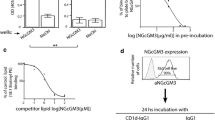Abstract.
Gangliosides are potentially useful targets for tumor destruction by antibodies. However, the role of gangliosides in T cell-mediated immunity to tumors is unclear. We produced three murine monoclonal anti-idiotypic antibodies (Ab2) against a monoclonal antibody (Ab1) that binds strongly to melanoma-associated GD2 ganglioside and weakly to GD3 ganglioside. All three Ab2 induced anti-anti-idiotypic antibodies (Ab3) with Ab1-like binding specificity to tumor cells and antigen in rabbits. The Ab3 specifically bound to GD2+ tumor cells and isolated GD2, and shared idiotopes with the Ab1. Two of the three Ab2 induced GD2-specific delayed-type hypersensitivity responses in BALB/c and C57BL/6 mice, but not in C57BL/6/CD4–/– mice. Peripheral blood mononuclear cells (PBMC) from a melanoma patient proliferated specifically in response to in vitro stimulation with Ab2. Proliferation was accompanied by Th1-type cytokine production. Our studies demonstrate the induction of ganglioside-specific T cell-dependent immunity by Ab2 in mice. These T cells showed specific reactivity to ganglioside expressed by tumor cells.
Similar content being viewed by others
Author information
Authors and Affiliations
Additional information
Electronic Publication
Rights and permissions
About this article
Cite this article
Basak, S., Birebent, B., Purev, E. et al. Induction of cellular immunity by anti-idiotypic antibodies mimicking GD2 ganglioside. Cancer Immunol Immunother 52, 145–154 (2003). https://doi.org/10.1007/s00262-002-0340-0
Received:
Accepted:
Issue Date:
DOI: https://doi.org/10.1007/s00262-002-0340-0




